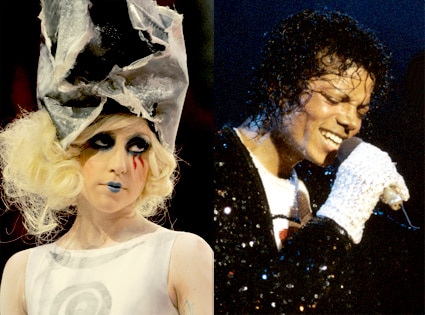Do We Have Real Superstars Anymore?
Sat., Feb. 6, 2010 9:00 AM PST by
Leslie Gornstein
Michael Caulfield/ Getty Images; Ebet Roberts/Getty Images
Is the superstar era over? Think Madonna, Michael Jackson, U2, the Boss. Is Lady Gaga the way to go now? Instant fame, (probably) quick decline?
—Pique Santos, via Facebook
Fame is still as famey as ever—in fact, more so.
Sure, there are literally more people able to see
Lady Gaga groping around in a Wild Rumpus suit than there were in the age of
Marilyn Monroe or the rise of
Michael Jackson. But that's no measure of the quality of someone's fame.
The intensity and universality of worship—how many different demographics adore an actor or singer—now, that's how you measure fame.
And
no new star who has risen in the past five years—not
Taylor Swift, not
Robert Pattinson, not Gaga—has...
...the same universal, almost holy adoration enjoyed by stars of previous generations.
And no matter what you say in the comments section, that's a fact.
How do I know? Because of the technology, stupid!
"Today you don't have to make the decision to leave the domestic sphere and go to the theater," Wheeler Winston Dixon, a film studies professor at University of Nebraska, explains. "Before, you'd need to go to the theater, where the star would be on a huge screen, and you would, essentially, worship the star."
That's right. Once, movie theaters were like temples; in fact, back in the 1910s and 1920s—true fact, kids—the average family went to the movies and saw giant, inaccessible, beautiful people
twice a week.
There are no real movie temples anymore, not when you can choose to stay at home, instantly download a flick and have a very-much-shrunken star come and pay homage to
you.
Most stars today are also overexposed compared with icons of yesteryear, and that even includes supposedly "private" actors like
Harrison Ford,
Susan Sarandon and
Natalie Portman.
Why? Too many media outlets and forms of communication, that's why. Even if we don't know exactly why Harrison Ford always seems to be asleep when he's talking, we at least have the technological ability to discuss this fact in a million different forums, and that dilutes a star's utter specialness.
"When Michael Jackson was at the top of his form, we only got the images that were given to us," says publicist Richard Laermer, whose forthcoming book,
How to Fame, discusses the end of the superstar era.
"That's how real celebrity was formed. If Epic wanted to show us Michael at home, that's what we got. You didn't see them every minute with curlers on, being besieged by paps who just want to laugh at these famous types. That's not what real celebrity is.
Elizabeth Taylor was not laughed at. She told us what to think of her—and we obeyed."
Crochety old people would likely blame
Twitter for part of the decline, too. Hey, let's all blame Twitter. There's a reason why we should: It lets stars talk too much.
"In order to be an icon, you have to be a mystery," Laermer points out. "Alas, there are no more mysteries!"
Lastly, consumers are all divided up.
In the old-timey days everybody, whether they were a farmer or a doctor or a spelunker or a governor, had the same basic choices for learning about a star: TV, radio or a newspaper. Not a ton of choices. If a newspaper editor or TV interviewer wanted to show us
Burt Reynolds, we had to watch Burt Reynolds.
Now, the teens have Twitter, the old people have
Leno, the still-older people have
Larry King, the hip Asian and European kids have crazy cell phones that do everything but cook and clean, moms have Facebook, music fans have MySpace, and
Tina Fey fans have YouFace.
And each one of those communities may crown a different celebrity as king or queen at any given time, and for as long as they want, before moving on.
"Icons emerge, but they are iconic within the realm that they emerge from," says University of Southern California professor Elizabeth Currid, who has a book about fame,
Star Power, coming out later this year. "I may worship
Anna Wintour and
Madonna as iconic individuals in the same breath because they are both the dominant stars of their respective fields. I would argue most people pick favorites within different types of popular culture."
Indeed. Favorites like the Answer B!tch. Isn't that true, my 20,000-plus Twitter fans?
http://www.eonline.com/uberblog/ask_the_answer_bitch/b165659_do_we_have_real_superstars_anymore.html

